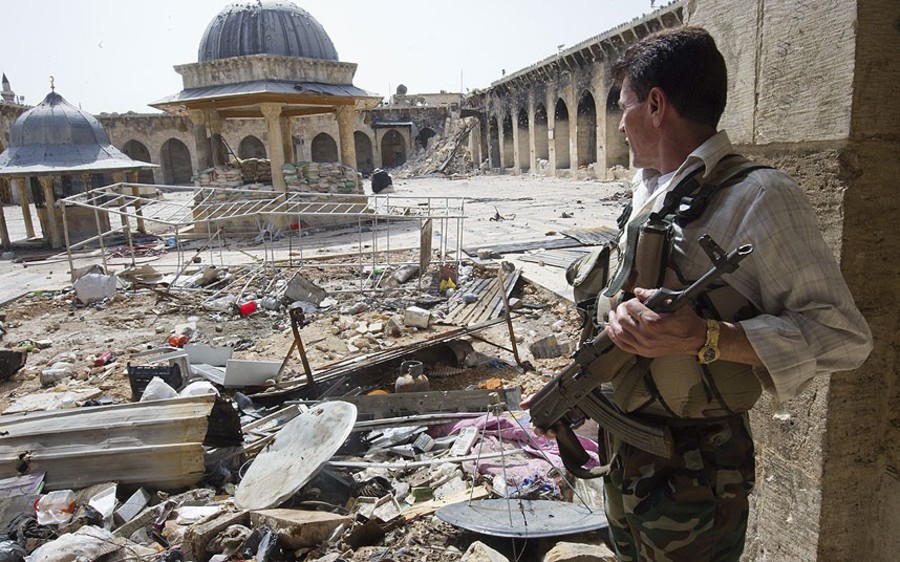Conferences and debates
Index / Activities / Conferences and debates / Destruction and trafficking of cultural goods in the Middle East
Destruction and trafficking of cultural goods in the Middle East
October 15, 20157:00 p.m.
MADRID
Casa Árabe Auditorium (at Calle Alcalá, 62).
7:00 p.m.
Free entry until the event’s capacity is reached.
In Spanish.
Alejandro Noguera Borel, an expert on Far East Classical Archeology,
will be describing the current situation in countries in conflict.
Noguera Borel, who is also the director of the Libertas 7 Foundation and the Museo L’Iber, will be introduced by Pedro Villena, the General Director of Casa Árabe.
At present, the destruction and illegal trafficking of antiques in the Middle East has resulted from the instability which has endured in the region for decades. Since ancient times, political and religious motives have been the main reasons behind the destruction of a large part of the region’s heritage, in an amount that we will never be able to quantify. However, iconoclasm is not exclusive to one religion or political system, though it is always the result of changes in a society, like that taking place right now in Syria with the premeditated destruction of monuments being carried out by the Islamic State.
Coupled with these problems, and often a result thereof, is the illegal trafficking of art objects, which on many occasions is a source of financing for mafias, armed groups and even States. It can only be repressed with the cooperation of local authorities and that of the countries where the pieces are sent or sold. It is obvious that raising awareness about this matter at the global level and achieving economic development in the countries of origin are the main ways to eradicate heritage trafficking.
At present, the destruction and illegal trafficking of antiques in the Middle East has resulted from the instability which has endured in the region for decades. Since ancient times, political and religious motives have been the main reasons behind the destruction of a large part of the region’s heritage, in an amount that we will never be able to quantify. However, iconoclasm is not exclusive to one religion or political system, though it is always the result of changes in a society, like that taking place right now in Syria with the premeditated destruction of monuments being carried out by the Islamic State.
Coupled with these problems, and often a result thereof, is the illegal trafficking of art objects, which on many occasions is a source of financing for mafias, armed groups and even States. It can only be repressed with the cooperation of local authorities and that of the countries where the pieces are sent or sold. It is obvious that raising awareness about this matter at the global level and achieving economic development in the countries of origin are the main ways to eradicate heritage trafficking.
Alejandro Noguera
Holder of a degree in Ancient History from the Université de Paris IV-Sorbonne, another degree in Classical Eastern Archeology from the École Pratique des Hautes Études in Paris, a diploma in Classical and Oriental Languages from the Sorbonne and Collège de France, a Master’s degree in Museology from the Universidad Complutense and a PhD in Ancient History from the University of Valencia.
He is the director of the Libertas 7 Foundation, of the Museo L’Iber of lead toy soldiers and the Valencian Institute of Classical and Eastern Studies (IVECO), as well as a trustee of the Cañada Blanch Foundation and a director of the UNESCO Valencia Association. He also collaborates with various cultural institutions, NGOs and non-profits.
Holder of a degree in Ancient History from the Université de Paris IV-Sorbonne, another degree in Classical Eastern Archeology from the École Pratique des Hautes Études in Paris, a diploma in Classical and Oriental Languages from the Sorbonne and Collège de France, a Master’s degree in Museology from the Universidad Complutense and a PhD in Ancient History from the University of Valencia.
He is the director of the Libertas 7 Foundation, of the Museo L’Iber of lead toy soldiers and the Valencian Institute of Classical and Eastern Studies (IVECO), as well as a trustee of the Cañada Blanch Foundation and a director of the UNESCO Valencia Association. He also collaborates with various cultural institutions, NGOs and non-profits.

